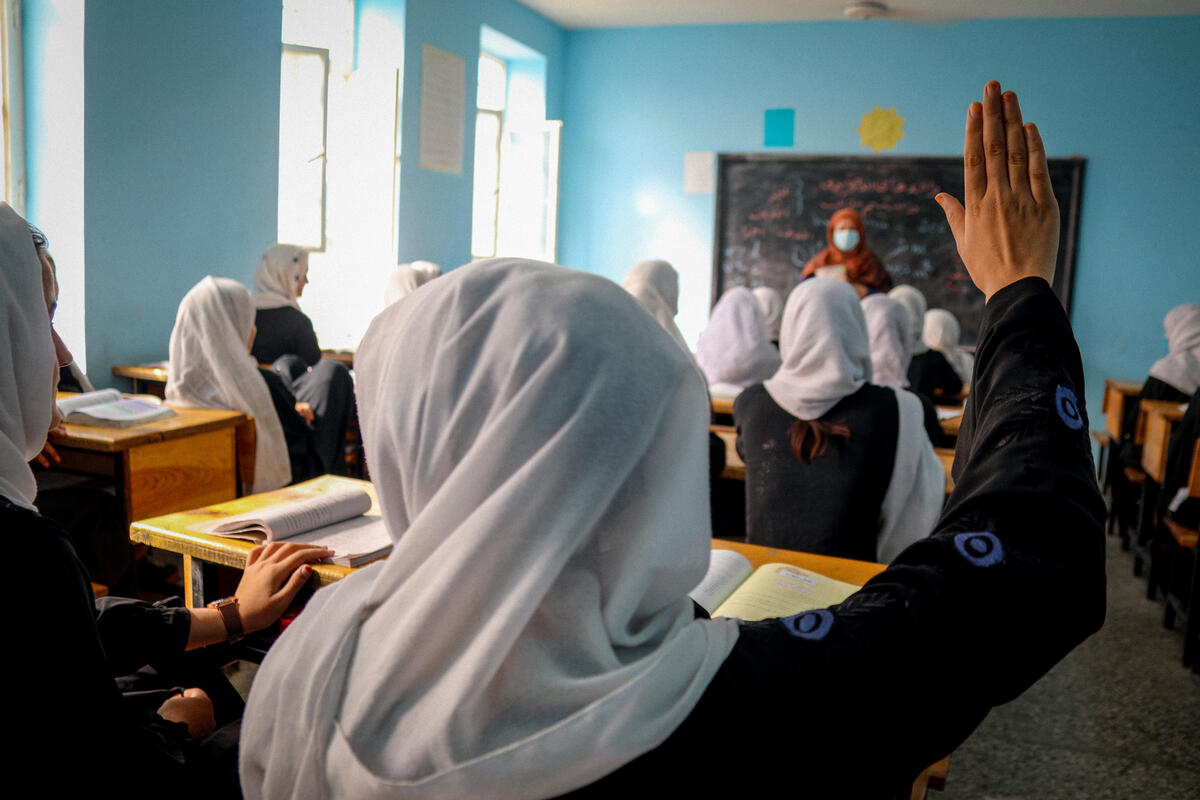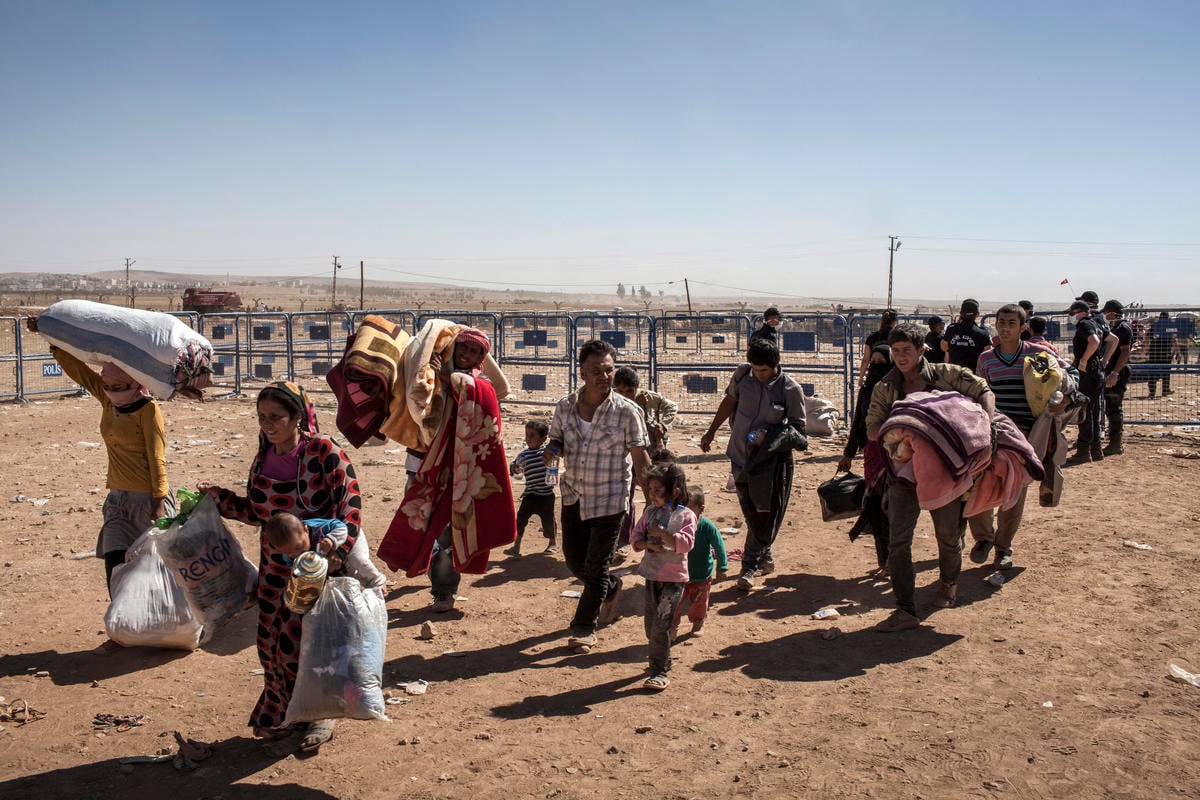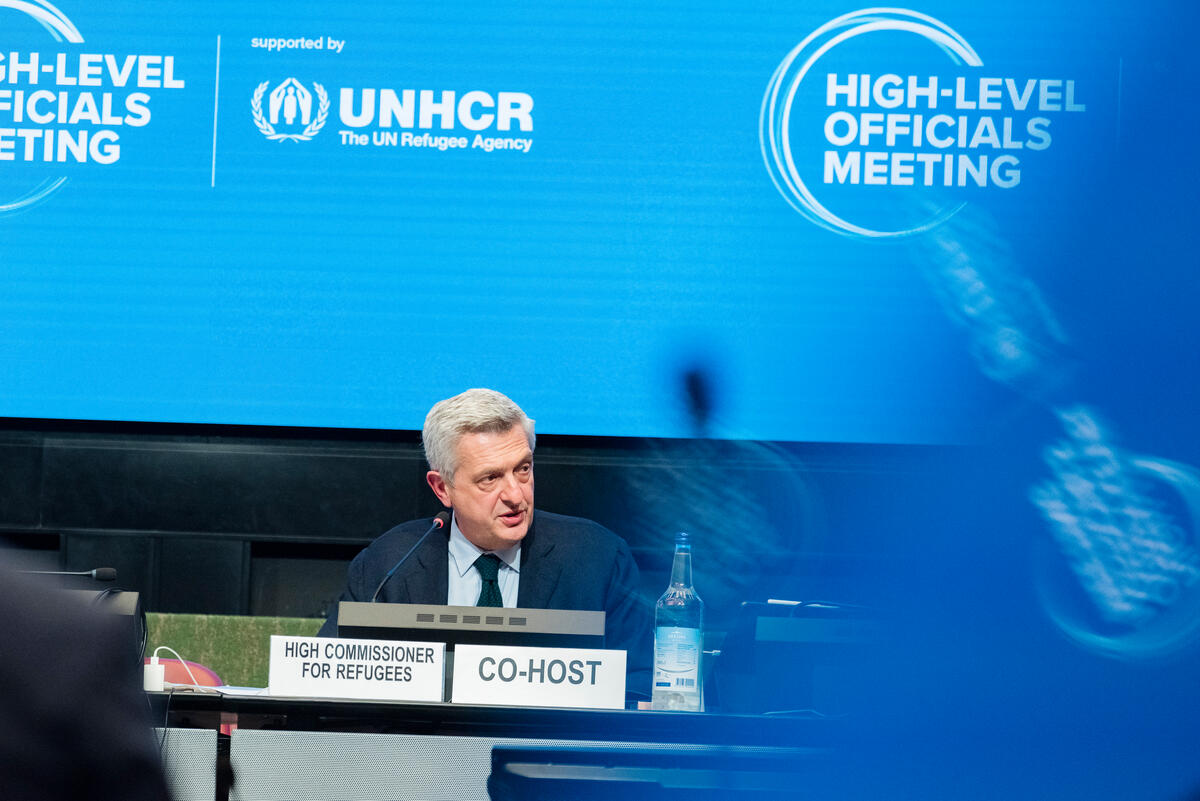Frequently asked questions
Frequently asked questions

This page provides information about the 2023 Global Refugee Forum (GRF) taking place in December. Interested stakeholders in the Australia, New Zealand and Pacific region can expand the questions below to find out more about what the GRF is and how they can get involved.
How can I attend the Global Refugee Forum?
Attendance is by invitation only.
A livestream of the plenaries will be available for those who wish to follow the event online.
Do I need a visa to enter Switzerland (to attend the GRF 2023)?
For information related to who requires a visa to enter Switzerland, the application process, and pre-departure formalities, participants are encouraged to consult the State Secretariat for Migration websiteLink is external for all short-term visa matters.
How can stakeholders get involved in the Global Refugee Forum?
GCR-related initiatives, listed on the Global Compact digital platformLink is external, are the main vehicles for getting involved, as they focus on mobilising support and developing pledges linked to the themes set out in the GCR and specific situations.
Additionally, stakeholder mays wish to:
-
Advocate for States and other stakeholders to include refugee advisors in their delegation
-
Contact UNHCR’s Advisory Board of Displaced and Stateless Persons
For more information about refugee-led organizations and engagement with the GRF process, see the following webpages:
Will there be refugee representatives at the Global Refugee Forum?
Yes. Refugee-led groups and networks are participating in planning meetings and briefings, refugees and stateless persons will serve as experts and advisers on pledges and GCR initiatives, and refugees will be included as speakers, moderators, and participants at the GRF.
All stakeholders attending the GRF are encouraged to include refugees as a part of their delegations. An independent delegation of refugee thematic experts and leaders will also be invited to the Global Refugee Forum. This delegate was selected through a call for expressions of interest launched in November 2022 and in line with principles of transparency and diversity of participation.
For more ways to get involved, please refer to the guide on 7 ways displaced and stateless people can actively engage in the next Global Refugee ForumLink is external, hosted on the GCR digital platform.
Key facts about the GRF 2019
-
3,000 participants
-
80+ events, sessions and exhibitions
-
1,400 pledgesLink is external announced in the lead-up to and during the GRF
-
350+ Good PracticesLink is external shared
-
Public interest and positive media coverage around the world
-
Unprecedented refugee participation (70+ refugees)
-
Launch of the Support Platforms & GCR InitiativesLink is external
-
10 Public events across Geneva and a Solidarity Train
-
Launch of GCR Digital Platform
Key facts about the GRF 2023
Plenary session (13-15 Dec 2023), Palexpo in Geneva, Switzerland
-
High-level representation from co-hosts and co-convenors, together with the United Nations Secretary-General.
-
Discussion will allow for governments and other stakeholders to make interventions and announce pledges
-
"GCR in Action” moments, where multi-stakeholder pledges that contribute to the GCR objectives and GRF 2023 key outcomes will be announced.
Parallel High-Level Events (12-15 December), at Palexpo in Geneva, Switzerland
-
Intended to highlight multi-stakeholder pledges, contributions, lessons learned, and good practices in support of the GCR objectives and proposed key outcomes of the GRF.
-
Feature a broad and diverse array of speakers from different stakeholder groups.
GRF Ecosystem (dates and locations shared in the programme closer to the Forum)
-
All events, both at Palexpo and offsite, including exhibitions, talks, linked events for GRF participants, and public events that showcase contributions to the Global Compact on Refugees.
For further information, contact hqgcr@unhcr.org
How does the RSVP process work?
Invitees are requested to confirm their participation by 1 December 2023.
A Note Verbale or letter of accreditation should be sent to hqgovern@unhcr.org, with:
- names and titles of all members of the delegation
- members in order of seniority
- head of delegation indicate
Due to the limited size of the venue, delegations are encouraged to limit the number of people present at Palexpo to between 3 and 5 at any given time.
Following the RSVP process, UNHCR will share a link to the Indico system for registration (closes on 1 December).
Is there a speakers list for the plenary session and when does it open?
There is a speakers list for the plenary, registration will open on 6 November. This is a General Assembly-mandated meeting, which calls for GA protocol.
The following information note provides details on registration, seating arrangements and interpretation: https://www.unhcr.org/media/grf2023-information-note-states-igos-and-un-entities.
How will the plenary session be divided up and how does the speakers list fit into this?
Pledge announcements will be around 20-30 mins at the start of each plenary (before the general debate). This segment will feature announcements by the organisers of multi-stakeholder pledges that have been pre-selected by the GRF steering committee (no time to announce all 30-40 MS pledges). It is anticipated that 6-10 MS pledges will be announced over the 3 days.
Then, during the general debate (interventions on burden and responsibility sharing – see program), states and other stakeholders can use their 3-minute intervention as they wish, including to announce pledges.
Can VIPs (PMs and Heads of State) be guaranteed a speaking slot during the plenary on 13.12?
The initial plenary session will open on 13.12 at 09:00 and end at 13:00. It will include the following items:
a. Opening remarks by the Co-Host
b. Statements by the United Nations Secretary-General and the Co-Convenors
c. Broadening the base of support
National statements will start after the above. It is therefore likely that only a few speakers will take the floor in the morning. The afternoon plenary starts at 15:00 and lasts until 18:00. It will include a segment for the announcement of multistakeholder pledges, followed by the continuation of national statements.
For the time being, it is impossible for UNHCR to confirm a specific speaking slot, given the fact that we do not know what the overall list of speakers will look like. This includes uncertainty around speech lengths of co-convenors and heads of state, who will be first in line to speak.
You are encouraged to check with the secretariat (hqgovern@unhcr.org) for requests of this nature, as they are best placed to deal with them.
I have plenary entrance badges, when should my delegation arrive on the opening day? (13.12)
Persons with plenary badges are encouraged to arrive between 07:00 and 08:45 on 13.12, to ensure smooth access to Palexpo
What are pledges?
Pledges and contributions are commitments that advance the objectives of the Global Compact on Refugees to achieve tangible benefits for refugees and host communities. These can be made by States and other stakeholders including organizations, development actors, cities, parliamentarians, businesses, academics, and refugees themselves.
What can be included in a pledge/contribution?
-
Financial, material, or technical support to host countries;
-
Places for resettlement and complementary pathways for admission to third countries, such as education opportunities for refugees; and
-
Changes to national laws and policies that enable refugees to become more self-reliant and better included. These can also include private sector investment, beneficial trade arrangements, and expanded educational and economic opportunities.
What are the focus areas for pledges and contributions?
For 2023, we encourage pledges designed to:
-
Ease the pressures on host countries
-
Enhance refugee self-reliance
-
Expand access to third-country solutions
-
Support conditions in countries of origin for return in safety and dignity
Following the first Global Refugee Forum in 2019 and beyond, States and other stakeholders are encouraged to make commitments in the following areas to provide a strategic focus and maximize our collective impact.
Who can make pledges and contributions?
-
UN Member States and observer States;
-
Stakeholders (international organizations, humanitarian and development actors; international and regional financial institutions; regional organizations; local authorities; civil society, faith-based organizations; academics and other experts; the private sector; media; host community members, and refugees themselves (Global Compact on Refugees, para. 3).
-
States and other stakeholders may make contributions either individually or jointly.
What is different for 2023?
Building on lessons from 2019, stakeholders are encouraged to make high-quality pledges.
What is a high-quality pledge?
-
It is aligned with the key recommendations that emerged from the High-Level Officials Meeting in December 2021Link is external;
-
Contributions are designed to be additional, quantifiable, and needs-driven;
-
Contributions are jointly developed, in a whole-of-society spirit;
-
It matches and supports a national pledge(s) surrounding inclusive policies;
-
It is developed in consultation with refugees and considers age, gender, and diversity.
Where do I update my 2019 pledge?
Host countries wishing to develop new policy pledges according to needs, gaps, and areas of interest for potential matching are invited to submit a new pledgeLink is external. Host countries wishing to update the status of their current policy pledges are invited to submit a pledge updateLink is external.
What is a multi-stakeholder pledge?
Multistakeholder pledges are joint pledges with a large-scale reach, working towards an ambitious common goal. They aim to put in place long-term arrangements that advance responsibility sharing and draw from a clear resource base, donorship, or financial instrument linked to the pledge’s implementation.
Stakeholders can get involved in developing pledges by participating in multi-stakeholder pledgesLink is external currently under development. UNHCR will facilitate discussions and provide guidance for developing pledges at the country, regional, or global levels. Pledging entities can also reach out to UNHCR (hqgcr@unhcr.org) for information.
What is a matching pledge and how do I submit one?
Pledge matching is an opportunity for donors to align their financial, material or technical support with existing policy pledges made by host countries. This means that pledges made by states to provide inclusion, protection, and support for refugees can be matched with the necessary assistance for their implementation. This provides a concrete and coordinated way for traditional and non-traditional partners to engage in responsibility sharing alongside states.
A pledge matching portalLink is external is available on the GCR Digital Platform. To match one of the host country pledges listed, please click the envelope button to the right of the pledge you want to match. If you would like to find out more about pledge matching, or to discuss other ways to get involved in the Global Refugee Forum 2023, please use this formLink is external.
Matching can be initiated bilaterally between two stakeholders, or UNHCR and other independent parties can act as facilitators and coordinators of discussions between pledging entities. To find out more read Pledge Matching in the Context of the GRF 2023.
What is a joint contribution?
Like multi-stakeholder pledges, joint contributions involve several stakeholders collaborating towards a collective goal. Examples of joint contributions could include:
Partnership contributions:
A group of States and/or other stakeholders form partnerships and announce contributions (based upon their respective capacities and areas of expertise) towards the achievement of a shared goal, such as supporting a host country to implement a policy providing refugee children with access to the national education system.
Common contributions:
A coalition of States or other stakeholders would announce identical or near-identical commitments. For example, a group of States could announce that they will each include refugees in their Voluntary National Reporting for the Sustainable Development Goals.
Do we update our pledges through Canberra or via Geneva?
-
To modify submitted pledges at the GRF in 2019, the pledging entity must coordinate with the country office to agree on the new text and then share it with the GCR coordination team.
-
To submit updates on pledge implementation, pledging entities must use the "Submit a progress update" form available on the GCR Digital Platform.
-
For new pledges, pledging entities must use the "Submit or match a pledge" form on the GCR digital platform. Please complete a separate form for each new pledge. When submitting your pledge, you will be able to indicate whether it is part of a multi-stakeholder pledge.
If you have any comments, queries, or notice any inaccuracies on the platform, please contact hqgcr@unhcr.org.
Where can I find examples of a good pledge/good practice?
Explore the links below to see examples of existing pledges, contributions and good practices:
Good Practices | The Global Compact on Refugees | UNHCR (globalcompactrefugees.org)Link is external
What is the deadline and format for the submission of new pledges?
Pledges can be submitted through the online form on the GCR digital platformLink is external at any time, but we strongly encourage you to make the submission before the GRF to facilitate effective pre-matchingLink is external. Any stakeholder wishing to have a good practice published in advance of the GRF 2023, are asked to submit them no later than 30 November 2023. All pledging entities will make an individual submission of their pledges. In the pledging form, they will be able to indicate if their pledge is a contribution to any of the multi-stakeholder pledge(s). They can also contact the GCR Coordination Team (hqgcr@unhcr.org) for guidance.
How will new pledges be recorded?
An updated multi-language pledge submission formLink is external will be launched mid-year to ensure that pledges are aligned with the key elements of a high-quality pledge outlined above. If pledges do not fully align with these elements, UNHCR will follow up with pledging entities to consider adjustments and determine the next steps.
New pledges may be submitted at any time leading-up to and following the GRF 2023. All pledging entities will make an individual submission of their pledges. In the pledging form, they will be able to indicate if their pledge is a contribution to any of the multi-stakeholder pledge(s).
Pledging entities are encouraged to share information about the pledges they are considering or working towards during the global briefings on the GRF in 2023 to facilitate matching in advance of the GRF and build momentum.
How will pledge implementation be tracked?
Similar to the first GRF, a light online self-reporting mechanism will continue to track pledges made by pledging entities. The reporting platform will remain open and updates will be requested every two years.
The results of these updates will appear on the pledges dashboard on the GCR digital platformLink is external, indicating whether a pledge is in the planning phase, in progress, or fulfilled. Analysis of progress towards pledge implementation will also be shared through regular briefings convened by UNHCR on the GCR and the GRF, as well as stocktaking for the 2025 High-Level Officials Meeting.
What will happen with unfulfilled pledges from the GRF 2019?
Pledges announced since 2019 will continue to be implemented, while new pledges are being developed. Pledging entities are encouraged to continue to provide progress updates on the implementation of their pledges, regardless of when they were made. For pledges not yet delivered, pledging entities are also encouraged to seek matches via the pledge matching portal on the GCR digital platformLink is external.
What is the GCR Indicator Report and when is it due to be published?
The GCR Indicator report is part of the follow-up and review of the GCR. Its overall objective is to measure and sustain progress towards achieving the four goals of the GCR. The report aims to measure and show how the international community implemented predictable and equitable responsibility-sharing to improve the lives of refugees and host communities.
The first indicator report was published in November 2021. The next edition of the GCR Indicator Report is due to be published on 17 November 2023.
How does the indicator report relate to the Forum?
The indicator report provides valuable data, key findings, and recommendations needed to develop high-impact pledges which address current gaps in responses. It is also designed to help guide discussions at forums and meetings, ensuring effective, evidence-based approaches to the achievement of the GCR objectives.
What’s next after the GRF 2023?
An online self-reporting mechanism will track pledges made by pledging entities, similar to the first GRF. The progress update process is ongoing, and entities that have made progress on pledge implementation are encouraged to submit updates. The analysis of progress towards pledges, which is available on the GCR digital platform, will be shared through regular briefings organized by UNHCR on the GCR and the GRF. Additionally, a stocktaking will be conducted for the 2025 High-Level Officials Meeting.
My question was not answered by the above information
If you would like to know more about something to do with the GRF that is not included in the information above, please contact us at aulcapi@unhcr.org.
More information
For more information, please visit the Global Refugee Forum webpage.









